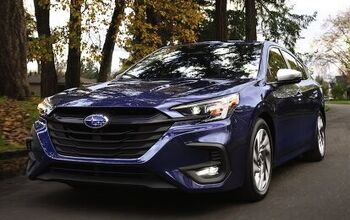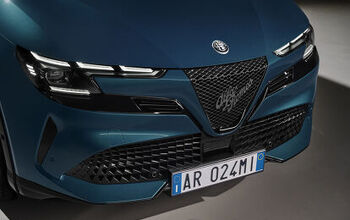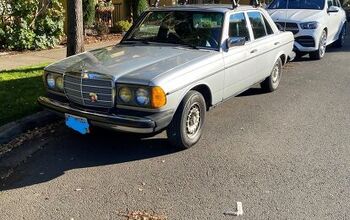It's a Cash Bonanza for Diesel Owners as Volkswagen Unloads Up to $14.7 Billion in the U.S.

Christmas is coming early for owners of polluting Volkswagen TDI models now that the automaker has agreed to pay up to $14.7 billion to settle claims in the diesel emissions scandal.
Volkswagen’s settlement with the federal government, owners and regulators will see it buy back some 475,000 2.0-liter diesel vehicles in the U.S. at pre-scandal values and offer their owners up to a cool $10,000 in extra compensation, according to figures reported by the New York Times.
Cash compensation varies depending on the age and model of the vehicle, but owners won’t see a payout of less than $5,100, the report said. Owners who ditched their TDI like a hot potato after the scandal became public are still eligible for compensation, but will only receive half of what’s being offered to existing owners.
Volkswagen will also forgive vehicle loans and pay off those acquired through third parties to the tune of 130 percent of what the owner would be eligible for under the buyback. Leases can be cancelled with no termination fee.
If they want to, owners of 2009-and-newer 2.0-liter diesel models can opt to have the manufacturer fix their vehicle to keep it on the road, though there could be drawbacks to that game plan. Older models would need fairly extensive work to bring the vehicle’s emissions levels into compliance, with power and fuel economy suffering as a result.
According to the settlement, the recall rate for the fix option must meet 85 percent. The Environmental Protection Agency hasn’t approved a mechanical fix for either the 2.0-liter or 3.0-liter diesels.
The EPA stated that owners will receive notices this fall, with the first buybacks occurring in October of this year.
Reaction to the settlement by lawmakers was strongly worded, to say the least. In a release from the EPA, Deputy Attorney General Sally Q. Yates stated, “By duping the regulators, Volkswagen turned nearly half a million American drivers into unwitting accomplices in an unprecedented assault on our atmosphere.”
She added, somewhat ominously (for Volkswagen), “This partial settlement marks a significant first step towards holding Volkswagen accountable for what was a breach of its legal duties and a breach of the public’s trust. And while this announcement is an important step forward, let me be clear, it is by no means the last.”
The massive price tag attached to the settlement — one of the costliest in U.S. history, and the largest for any automaker — tops early estimates by about $4.5 billion. Of the total cost of dealing with scandal fallout in the U.S., $10.03 billion will go towards the buyback and compensation program.
On the environmental front, the rest of Volkswagen’s settlement cash will be spent on remediation programs designed to make up for the air pollution emitted by its defeat device-fitted diesels since 2009. $2.7 billion goes to the EPA to create a fund for green projects, and $2 billion will be spent by the automaker on zero-emission vehicle projects.
If it creates marketable products, that could be money well spent for Volkswagen.
While the $14.7 billion wraps up the vehicle side of the scandal in the U.S. (reputation damage will take longer to fix), criminal penalties are still on the way. It’s a good thing the automaker set aside a larger amount of cash for the task at hand. The New York Times reports that penalties totaling $500 million could land on Volkswagen this week, the result of investigations by the Justice Department and the governments of 42 states, D.C. and Puerto Rico.
In a media release, Frank Witter, Volkswagen’s chief financial officer, stated, “Today’s announcement is within the scope of our provisions and other financial liabilities that we have already disclosed, and we are in a position to manage the consequences. It provides further clarity for our U.S. customers and dealers as well as for our shareholders. Settlements of this magnitude are clearly a very significant burden for our business.”
Financial regulators in the U.S. and the governments of various countries still haven’t asked for their pounds of flesh, so costs will continue to mount. The bulk of the company’s diesels went to European consumers, meaning settlements for untold amounts of money still loom. The wildly expensive U.S. settlement could embolden governments to take Volkswagen for all it has (or all it has left).
In Germany, authorities are investigating brand chief Herbert Diess and former CEO Martin Winterkorn to find out what they knew about the emissions cheating prior to the scandal.
[Image: Frankieleon/ Flickr]

More by Steph Willems
Latest Car Reviews
Read moreLatest Product Reviews
Read moreRecent Comments
- ToolGuy This thing here is interesting.For example, I can select "Historical" and "EV stock" and "Cars" and "USA" and see how many BEVs and PHEVs were on U.S. roads from 2010 to 2023."EV stock share" is also interesting. Or perhaps you prefer "EV sales share".If you are in the U.S., whatever you do, do not select "World" in the 'Region' dropdown. It might blow your small insular mind. 😉
- ToolGuy This podcast was pretty interesting. I listened to it this morning, and now I am commenting. Listened to the podcast, now commenting on the podcast. See how this works? LOL.
- VoGhost If you want this to succeed, enlarge the battery and make the vehicle in Spartanburg so you buyers get the $7,500 discount.
- Jeff Look at the the 65 and 66 Pontiacs some of the most beautiful and well made Pontiacs. 66 Olds Toronado and 67 Cadillac Eldorado were beautiful as well. Mercury had some really nice looking cars during the 60s as well. The 69 thru 72 Grand Prix were nice along with the first generation of Monte Carlo 70 thru 72. Midsize GM cars were nice as well.The 69s were still good but the cheapening started in 68. Even the 70s GMs were good but fit and finish took a dive especially the interiors with more plastics and more shared interiors.
- Proud2BUnion I typically recommend that no matter what make or model you purchase used, just assure that is HAS a prior salvage/rebuilt title. Best "Bang for your buck"!


































Comments
Join the conversation
So if the recall rate only has to hit 85%, then 15% of owners may be able to keep their VW operating in current condition, that'll be an interesting vehicle to have 20 years from now.
"unprecedented assault on our atmosphere" good grief, hyperbole much EPA? This episode just proves how useless these regulations are, VW skirts them and no one dies, the earth is not covered in badness and our atmosphere remains assaulted.....